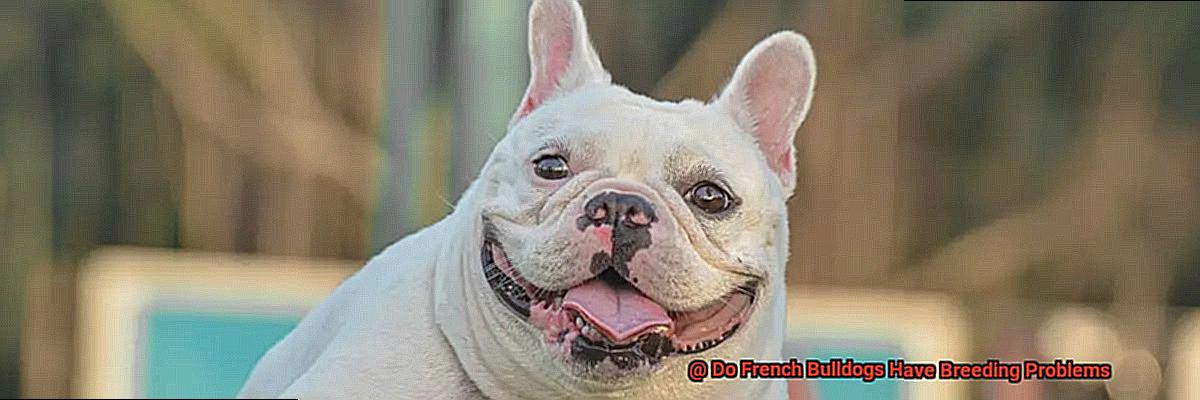Do French Bulldogs Have Breeding Problems?
Today, we’re tackling a burning question in the canine kingdom: do French Bulldogs have breeding problems? These little cuties with their unique looks and lovable personalities have skyrocketed in popularity.
But with fame comes scrutiny, and concerns about their breeding practices have been buzzing around. In this post, we’re going to dig deep into the potential issues that can arise when breeding Frenchies.
So, grab your favorite furry friend and let’s embark on a journey through the intriguing world of French Bulldog breeding.
Unique Physical Characteristics and Genetic Predispositions of French Bulldogs
Contents
- 1 Unique Physical Characteristics and Genetic Predispositions of French Bulldogs
- 2 Difficulty in Natural Reproduction of French Bulldogs
- 3 High Rate of Cesarean Sections in French Bulldogs
- 4 Small Gene Pool and Increased Prevalence of Genetic Disorders in French Bulldogs
- 5 Brachycephalic Syndrome: Respiratory Problems in French Bulldogs
- 6 Irresponsible Breeding Practices and the Impact on Health Issues
- 7 How to Find Reputable Breeders for Your French Bulldog
- 8 Tips for Managing and Preventing Breeding-Related Problems in French Bulldogs
- 9 Conclusion
French Bulldogs are undeniably adorable, with their expressive eyes, bat-like ears, and compact bodies. However, it’s essential to recognize that their unique physical characteristics and genetic predispositions can lead to breeding problems. In this article, we will delve into the specific challenges faced by French Bulldog breeders and offer insights for responsible owners.
Brachycephalic Skull Shape:
French Bulldogs possess a distinctive brachycephalic (short and pushed-in) skull shape. While this feature adds to their charm, it can contribute to respiratory issues. Their shortened muzzle and narrow nostrils make breathing difficult, especially in hot and humid conditions.
Compact Body Structure:
The compact and muscular body structure of French Bulldogs may pose challenges during breeding. Natural mating can be problematic due to the size and shape of their bodies, necessitating artificial insemination as a more feasible option for successful breeding.
Genetic Predispositions:
French Bulldogs have a higher predisposition to certain genetic health conditions, including Brachycephalic Obstructive Airway Syndrome (BOAS). This syndrome affects their ability to breathe properly, leading to respiratory distress during exertion or in extreme temperatures.
Other Health Issues:
Apart from BOAS, French Bulldogs are prone to hip dysplasia, patellar luxation, and intervertebral disc disease. These conditions can impact their mobility and overall quality of life.
Responsible Breeding Practices:
To minimize the risk of passing on these health issues to future generations, responsible breeders conduct thorough health screenings and genetic testing before breeding French Bulldogs. It is crucial for breeders to prioritize the health and well-being of their dogs over appearance.
Choosing a Reputable Breeder:
Potential owners of French Bulldogs should seek out reputable breeders who prioritize health over profit. Responsible breeders will provide health certificates, genetic testing results, and a comprehensive understanding of their breeding program.
Proactive Care for French Bulldogs:
Owners should be prepared for potential health issues that may arise in their French Bulldogs and take proactive steps to ensure their well-being. Regular veterinary check-ups, maintaining a healthy weight, providing adequate exercise, and avoiding extreme temperatures are vital in managing and preventing breeding-related problems.
Difficulty in Natural Reproduction of French Bulldogs
The Challenges of Breeding French Bulldogs: Why it’s Not as Easy as it Seems.
Ah, French Bulldogs. With their cute little faces and playful personalities, it’s no wonder they’ve become such a popular breed. But did you know that these adorable pups actually face some challenges when it comes to natural reproduction? That’s right, breeding French Bulldogs can be quite a tricky task. As an expert in the field, I’m here to shed some light on the difficulties these dogs face and why responsible breeding practices are so important. So, grab a cup of coffee and get ready to learn.
Unique Anatomy, Unique Problems
French Bulldogs have a compact and brachycephalic skull shape, which can lead to respiratory issues and difficulties in breathing during mating. Imagine trying to get busy with a blocked nose – not exactly ideal, right? These breathing problems can make it challenging for French Bulldogs to engage in natural breeding.
Hips Don’t Lie…or Do They?
Another factor that contributes to the difficulty in natural reproduction for French Bulldogs is their narrow hips and small pelvis. This can make it tough for the male to successfully mount the female during mating. And let’s not forget about the females. Their small pelvis size can make it challenging for them to give birth naturally, increasing the likelihood of needing a cesarean section.
Reproductive Disorders Galore
French Bulldogs also have a higher rate of reproductive disorders compared to other breeds. From infertility issues to hormonal imbalances and irregular heat cycles, these problems can make it difficult for them to conceive or carry a pregnancy to term. It’s crucial for breeders to be aware of these potential issues and work closely with veterinarians who specialize in reproductive health.
The Dark Side of Popularity
Unfortunately, the popularity of French Bulldogs has led to an increase in irresponsible breeding practices. Some breeders prioritize profit or aesthetics over the health and well-being of the dogs, leading to further breeding problems. It’s essential for breeders and prospective owners to prioritize responsible breeding practices and ensure the health of these lovable pooches.
Artificial Insemination to the Rescue
Due to the challenges associated with natural reproduction, many French Bulldog breeders turn to artificial insemination as a more reliable method of breeding. This allows for better control over the timing of mating and increases the chances of successful conception. However, it’s important for breeders to follow ethical practices and ensure both the male and female are healthy and suitable for breeding.
High Rate of Cesarean Sections in French Bulldogs
If you’ve ever wondered why these adorable pups have one of the highest rates of cesarean sections among dog breeds, you’re in the right place. As a canine expert with a passion for French Bulldogs, I’m here to shed some light on this topic and help you understand the unique challenges these lovable dogs face when it comes to giving birth naturally.
The Anatomy Dilemma:
French Bulldogs are known for their compact and muscular bodies, but it’s their distinctive features that make birthing a bit complicated. Their large heads and narrow pelvises pose a real challenge when it comes to delivering puppies naturally.
Oversized Heads and Narrow Birth Canals:
Picture this: French Bulldog puppies with relatively large heads compared to their petite bodies. Now imagine them trying to squeeze through a small and narrow birth canal. It’s not exactly a smooth pathway, is it? This combination of physical traits often leads to dystocia or difficulty in giving birth without assistance.
The Life-Saving Role of Cesarean Sections:
To ensure the safety of both the mother and her puppies, many French Bulldogs require cesarean sections. This surgical procedure involves making an incision in the mother’s abdomen to deliver the puppies safely. While it may sound alarming, it’s actually a life-saving intervention that reduces the risk of complications during birth.
The Breeding Conundrum:
Now, let’s address the elephant in the room: the ethical issues surrounding breeding dogs that are prone to needing cesarean sections. Responsible breeders must carefully select mating pairs, considering health and physical characteristics to minimize the need for surgical intervention. This approach prioritizes animal welfare and helps maintain the overall health of the breed.
Take Precautions for a Safe Delivery:
For all you aspiring French Bulldog breeders out there, regular prenatal care and monitoring are crucial. By keeping a close eye on the mother’s health and the puppies’ development, you can identify any potential complications early on and ensure a safe delivery for everyone involved.
Conclusion:
In a nutshell, the high rate of cesarean sections in French Bulldogs is due to their unique body shape and physical characteristics. As responsible owners and breeders, it’s our duty to prioritize the health and well-being of these amazing dogs. By understanding their birthing challenges and taking necessary precautions, we can help ensure safe deliveries for French Bulldogs everywhere.

Small Gene Pool and Increased Prevalence of Genetic Disorders in French Bulldogs
However, behind their adorable facade lies a troubling issue: the prevalence of genetic disorders due to a small gene pool. In this blog post, we will explore how the limited genetic diversity of French Bulldogs contributes to the increased occurrence of these disorders and what responsible breeders and owners can do to mitigate their impact.
The Small Gene Pool:
French Bulldogs, like many purebred dogs, originated from a small number of individuals selectively bred for specific traits. This deliberate breeding focus on desired characteristics, such as their distinctive appearance and friendly temperament, has inadvertently contributed to a limited gene pool. With a narrow genetic base, French Bulldogs have a higher risk of passing on inherited health conditions to their offspring.
Common Genetic Disorders in French Bulldogs:
- Brachycephalic Airway Syndrome: This disorder is characterized by a narrowed airway, making breathing difficult for French Bulldogs, particularly during exercise or in hot weather. Snoring, coughing, and gagging are often observed in affected dogs.
- Intervertebral Disc Disease: The discs that cushion the vertebrae in the spine can degenerate over time, leading to pain, mobility issues, and even paralysis. French Bulldogs are predisposed to this condition due to their unique body structure.
- Skin Allergies and Dermatitis: Many French Bulldogs suffer from skin allergies that cause itching, redness, hair loss, and recurrent skin infections. These allergies can be triggered by environmental factors or food sensitivities.
- Hip Dysplasia and Patellar Luxation: These orthopedic conditions affect the joints and can cause pain, lameness, and difficulty in movement.
- Eye Problems: French Bulldogs are prone to various eye issues such as cataracts and cherry eye, which can affect their vision and overall well-being.
- Cardiac Issues: Some French Bulldogs may develop heart-related problems, including valve disorders and cardiomyopathy.

Challenges in Eliminating Genetic Disorders:
The small gene pool poses challenges for breeders in their efforts to eradicate these genetic disorders. Limited options for genetically diverse mates often lead to inbreeding, further increasing the risk of passing on inherited conditions. Inbreeding intensifies the likelihood of detrimental recessive genes combining and manifesting as genetic disorders in offspring.
Responsible Breeding and Health Testing:
Responsible breeders play a crucial role in improving the health of French Bulldogs. By prioritizing genetic diversity and carefully selecting mating pairs, breeders aim to reduce the prevalence of genetic disorders. Health testing, including hip and elbow evaluations, eye examinations, and genetic screening, helps identify potential issues before breeding.
Brachycephalic Syndrome: Respiratory Problems in French Bulldogs

French Bulldogs are beloved for their unique appearance, characterized by a short, flat face and a cute snub nose. However, this distinctive feature comes with a price – an increased risk of respiratory problems known as brachycephalic syndrome. In this article, we will explore the causes and symptoms of this condition in French Bulldogs and provide strategies for managing it.
Causes of Brachycephalic Syndrome in French Bulldogs:
The primary cause of brachycephalic syndrome in French Bulldogs is their unique anatomy. The flattened face, shortened muzzle, and narrow airways result in a structural abnormality that hampers the dog’s ability to breathe properly. The specific factors contributing to this syndrome include:
- Elongated Soft Palate: The soft palate, located at the back of the throat, becomes elongated and obstructs the airway, making breathing difficult.
- Stenotic Nares: French Bulldogs often have narrowed nostrils, restricting airflow and causing increased respiratory effort.
- Laryngeal Collapse: The larynx can collapse partially or completely, further obstructing the airway and compromising breathing.
Symptoms of Brachycephalic Syndrome:
It is essential for French Bulldog owners to recognize the signs of brachycephalic syndrome to ensure prompt veterinary intervention. Common symptoms include:
- Difficulty Breathing: French Bulldogs with this syndrome may exhibit labored breathing, rapid breathing, or even gasping for air.
- Snoring: Due to the narrowed airways, snoring during sleep is a common occurrence in affected dogs.
- Snorting and Wheezing: The restricted airflow can lead to snorting sounds and wheezing during physical activity or excitement.
- Exercise Intolerance: French Bulldogs with brachycephalic syndrome may tire quickly during exercise due to the respiratory strain.
Managing Brachycephalic Syndrome in French Bulldogs:
While brachycephalic syndrome cannot be cured, there are strategies to manage and improve the quality of life for affected French Bulldogs. Here are some helpful tips:
- Weight Management: Maintaining a healthy weight is crucial, as excess weight can exacerbate breathing difficulties.
- Cool and Well-Ventilated Environment: Ensure your French Bulldog has access to a cool and well-ventilated space, especially during hot weather, as they are more prone to heat exhaustion and heatstroke.
- Avoid Strenuous Exercise: Limit intense physical activity that may put additional strain on the dog’s respiratory system. Short, low-impact walks are preferable.
- Use Harnesses instead of Collars: Collars can put pressure on the neck and potentially worsen breathing difficulties. Opt for a harness that distributes pressure more evenly.
Irresponsible Breeding Practices and the Impact on Health Issues
Today, we’re going to dive deep into the world of French bulldogs and the impact that irresponsible breeding practices can have on their health. Brace yourselves, because this is a topic that needs to be addressed.
Brachycephalic Syndrome: A Breath of Trouble
Picture this: you’re on a warm summer day, enjoying the sunshine, when suddenly your French bulldog starts struggling to breathe. It’s a terrifying sight, but unfortunately, it’s all too common for these lovable pooches. Irresponsible breeding practices can exaggerate their brachycephalic features, making it even harder for them to catch their breath. This can result in life-threatening situations, especially when the heat is on or they’re engaging in physical activities.
Spinal Disorders: A Pain in the Back
French bulldogs are known for their unique body structure, but it comes at a cost. Intervertebral disc disease and hemivertebrae are just a couple of spinal disorders that can plague these adorable pups. And guess what? Irresponsible breeding practices can make matters worse by not taking into account genetic predispositions or performing necessary health screenings on parent dogs. The result? Chronic back pain, mobility issues, and even paralysis.
Skin Problems: Wrinkles Gone Wrong
Who can resist those cute little wrinkles and folds on a French bulldog’s face? But here’s the thing – those wrinkles can become a breeding ground for allergies, dermatitis, and nasty skin infections. Irresponsible breeders often overlook the importance of maintaining proper hygiene or minimizing excessive skin folds. As a result, our furry friends suffer from increased risks of infections and constant discomfort.
Hereditary Diseases: Passing on the Pain
Hip dysplasia, cataracts, cherry eye – these are just a few examples of the hereditary diseases that French bulldogs are prone to. Irresponsible breeders may not prioritize genetic testing or selective breeding to reduce the occurrence of these conditions within the breed. As a result, our beloved bulldogs may be more likely to develop these health issues, causing pain and reducing their quality of life.
So, what’s the solution? Responsible breeding practices. It’s crucial that breeders prioritize the health and well-being of French bulldogs by conducting necessary health screenings, genetic tests, and carefully selecting breeding pairs. This helps to minimize the occurrence of genetic disorders and ensures that future generations are healthier and free from unnecessary suffering.
How to Find Reputable Breeders for Your French Bulldog
Finding a reputable breeder is crucial when adopting a French Bulldog. Reputable breeders prioritize the health and well-being of their dogs, ensuring responsible breeding practices and producing healthy, well-socialized puppies. In this article, we will provide you with practical tips on how to find reputable breeders for your French Bulldog, ensuring you bring home a happy and healthy companion.
Importance of finding a reputable breeder:

Finding a reputable breeder is essential to ensure the health and well-being of your French Bulldog. Reputable breeders prioritize responsible breeding practices, resulting in healthier puppies with fewer genetic issues. They also provide proper socialization and care, producing well-adjusted and happy dogs.
Research and background check:
Thorough research is key when looking for a reputable breeder. Seek recommendations from trusted sources such as veterinarians, breed clubs, or other French Bulldog owners. Read reviews and testimonials to get an idea of the breeder’s reputation. Look for breeders registered with kennel clubs or breed organizations, demonstrating their commitment to maintaining breed standards.
Visit the breeder:
Visiting the breeder’s facility or home is crucial to assess the living conditions and environment in which the puppies are raised. Observe cleanliness, space availability, and socialization opportunities for the dogs. Look out for signs of neglect or overcrowding, as these may indicate potential health or behavioral issues.
Meet the breeder and ask questions:
Engage in conversation with the breeder to get to know them better. Ask about their experience, breeding practices, and any health testing they undertake for their breeding dogs. Inquire about specific health issues common in French Bulldogs and how they manage or prevent them. Reputable breeders should be open and transparent about these matters.
Health guarantees and follow-up support:
Reputable breeders provide health guarantees that cover genetic health issues for a specified period. Ensure the breeder offers follow-up support and guidance to new owners, indicating their commitment to the well-being of their puppies throughout their lives. Inquire about any post-purchase support or resources they provide, such as training advice or access to a network of fellow French Bulldog owners.
By following these guidelines and conducting thorough research, you can find a reputable breeder for your French Bulldog. Remember to visit the breeder in person, ask questions, and ensure they provide proper documentation and support. By choosing a reputable breeder, you are giving yourself the best chance of bringing home a healthy and happy French Bulldog companion.
Tips for Managing and Preventing Breeding-Related Problems in French Bulldogs
French Bulldogs are adorable and lovable companions, but they can experience breeding-related problems due to their unique anatomy and genetic predispositions. As responsible owners and breeders, it’s crucial to be aware of these issues and take proactive measures to manage and prevent them. In this article, we will explore some helpful tips for keeping our French Bulldogs healthy and happy.
Artificial Insemination: Overcoming Natural Mating Challenges
French Bulldogs may have difficulty with natural mating due to their compact body structure and oversized heads. Artificial insemination (AI) is a safe and effective solution that helps ensure successful reproduction. By collecting semen from the male and inseminating the female using various techniques, AI eliminates the need for natural mating and increases the chances of successful breeding.
Planned Caesarean Sections: Ensuring Safe Deliveries
Due to their narrow hips and large heads, natural birth can be risky for both mother and puppies. It’s important for breeders to monitor pregnancies closely, consult with veterinarians, and schedule planned caesarean sections when necessary. This ensures the safety of both the mother and her precious little ones.
Thorough Health Screenings: Selecting Healthy Breeding Pairs
French Bulldogs are prone to various health issues that can affect their ability to breed successfully. Before breeding a French Bulldog, it is vital to conduct thorough health screenings. This helps identify any potential genetic or hereditary issues that could be passed on to future generations. By selecting healthy and genetically sound breeding pairs, we can significantly reduce the risk of breeding-related problems.
Proper Nutrition: Fueling Reproductive Health
A balanced diet that meets the specific nutritional needs of French Bulldogs is crucial for maintaining reproductive health. During pregnancy and lactation, it’s even more important to provide optimal nutrition. Consult with veterinarians or canine nutritionists to determine the best diet for your French Bulldog and ensure their reproductive health.
Exercise Responsibly: Maintaining Overall Health
Regular exercise is essential for maintaining overall health and preventing obesity in French Bulldogs. However, it’s important to consider their physical limitations and respiratory issues. Engage in gentle activities that promote both mental stimulation and physical well-being. Remember, a healthy French Bulldog is a happy one.
Conclusion
In conclusion, it is evident that French bulldogs do indeed have breeding problems. These adorable canines may be popular pets, but their breeding history has left them susceptible to a range of health issues. From respiratory problems to spinal abnormalities, Frenchies face a host of genetic challenges that can significantly impact their quality of life.
Breeding practices have played a significant role in exacerbating these problems. The demand for French bulldogs has led to irresponsible breeding practices, including the excessive use of certain traits like short muzzles and compact bodies. These desirable features may enhance their cuteness factor, but they also contribute to a myriad of health complications.
One of the most common issues faced by French bulldogs is brachycephalic airway syndrome. Their flat faces and narrow nostrils make it difficult for them to breathe properly, leading to chronic respiratory difficulties. This condition not only affects their ability to exercise and play but can also lead to life-threatening situations.
Furthermore, Frenchies are prone to orthopedic problems such as hip dysplasia and intervertebral disc disease due to their unique body structure. Their stocky build and short legs put extra strain on their joints and spine, increasing the risk of painful conditions that require medical intervention.
Reproductive challenges are also prevalent among French bulldogs. Due to their small pelvises and oversized heads, natural mating can be difficult or even impossible for some individuals. This often necessitates artificial insemination or even cesarean sections during birth, posing additional risks for both the mother and her offspring.
It is crucial for potential owners and breeders alike to be aware of these issues before deciding to bring a French bulldog into their lives. Responsible breeding practices that prioritize health over appearance are essential in mitigating these problems. By working with reputable breeders who prioritize genetic testing and responsible pairings, we can help ensure the well-being of future generations of Frenchies.
In conclusion, while French bulldogs may be undeniably adorable, their breeding problems cannot be ignored. It is our collective responsibility to promote ethical practices and prioritize the health and well-being of these lovable companions.




